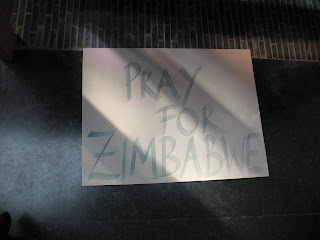
Listen ¦ Download
She was asked about why the day of prayer for Zimbabwe was called.
"Churches are always reminded to use prayer during times of turmoil and conflict. We want to call on God to help guide us through these difficult situations. So bringing all the churches in the world as much as possible together to pray for the situation so the calm can prevail. It also helps those on the ground to know that they are not alone, that there are others who are thinking about them during this time," she says.
But what can prayer do that mediation and political pressure have been unable to do? Giddings Ivory says, "We're sometimes amazed even in our own family situation when we take the time to say something out loud in prayer or in conversation. How it makes it more concrete and realistic. It also helps to reflect back to ourselves what we may want to happen. It helps us to move forward to do that. And we, those of us who believe that there is a God, who controls everything…are calling on God to help control the minds and thinking and actions of those who are participating in this election process."
Asked whether a day of prayer is getting churches involved in politics, she says, "Jesus was involved in politics. He talked to politicians and tax collectors. And so we're following the examples of Jesus. And we should not think of any institution or processes that are beyond our own understanding of where God is in the world."
The general secretary of the World Council of Churches, Rev. Samuel Kobia, is quoted as saying, "It is impossible to overstate the importance of this election, its fairness, its outcome and its aftermath." Giddings Ivory says the council has taken an official position on democratic reforms.
"The World Council of Churches and its governing body…approved a statement (in February) on the democratic electoral processes. It referred to the United Nations Millennium Declaration that commits the nations of the world to promote democracy and strengthen the rule of law, as well as respect for all internationally recognized human rights and fundamental freedoms. So the World Council of Churches and its member denominations are celebrating the fact that more nations around the world are embracing democracy in order to bring about human rights and freedoms for all people who may live within a particular country and wanting to protect that as much as possible."





0 Comments:
Post a Comment